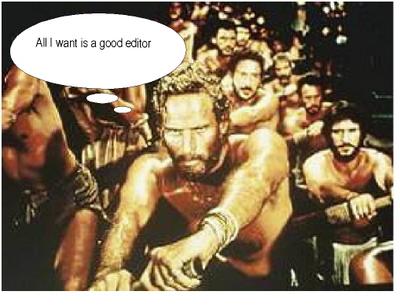Galley slavery

I'm not the first person to ask this question and won't be the last: What has happened to editors? Did all the good ones get sucked up into the alien ship back in '45 with the lost airmen of Flight 19? If so, are they ever coming back? I just got my galleys today for An Unquiet Grave and I can't believe the typos, mistakes, and miscellaneous junk that is still in there. Now, mind you, I know this is my book and that I must assume some responsibility for its errors. But I know I didn't put some of this stuff in there! Man, this is scary.
We all know the usual reasons cited for the deterioration in editing: Merging of publishers, cutbacks of in-house staff and the trend to using free-lance editors, a general decline in editing skills of young folks coming into the business (who are paid slave wages anyway). But why can't this be fixed?
Let's back up with this diatribe. I got into this novel racket back in 1979 as a writer of mainstream women's fiction. (That was the euphemism of the era for big fat books about sex, power and dysfunctional families). I had a terrific line editor, but even more impressive was the quality of the copy editing in those days. Through the four books I did for Ballantine/Fawcett I was blessed with the pickiest, sharpest-eyed, obsessive, anal-grammarians an author could ever wish for. They caught my misspellings, my lay-lie transgressions, my syntax sins.
My favorite copy editor was one I had for my British editions. This woman (for some reason, I pictured her as female, a spinster sitting in a ratty wingback by the fire in some Devonshire outpost surrounded by cats and towers of manuscripts) who dripped blood-red pencil all over my pages. At one point, she scribbled in the margins next to my French phrases: "I don't believe, based on the English errors uncovered thus far in this novel, that we should trust the author's ability to write in another language." She also took me to task for my "crutches": "This author has an unfortunate propensity to use "stare" and "padded" (e.g. he padded toward the door). Would suggest striking every reference." I hated that woman. God, how I miss her now.
Every author has horror stories about bad editing. I had a copy editor who changed the color of key lime pie to green. Being in Manhattan, I guess she never saw a key lime -- which is yellow. But shoot, I was the one who had to answer the boy-are-you-dumb emails from fellow Floridians, not her. And then there is the infamous Patricia Cornwell gaffe -- the cover flap that talked about a grizzly murder -- which set off a whole new sub-genre, the serial killer bear.
Like I said, I am not abdicating my responsibility. But when you spend eight months to a year writing a book, you get so close to it sometimes you can't see the trees for the forest. You're so intent on plot and character, you forget you've changed a character's name halfway through. Or that it's MackiNAW City but MackiNAC Island. Or that loons don't stick around Michigan in winter...they migrate. One year I got so paranoid I hired a copy editor. She caught so many mistakes it made me even more paranoid about what still lay (lie? lain?) beneath.
That's why I have galley anxiety this week. See, the galleys are my last chance to ferret out the errata. And that pile of paper is lurking there behind me right this minute, daring me to take it on.
I don't want to go into battle. Because these days, no one has my back.



2 Comments:
I wonder too and while reading bestsellers. Why do some of these things get through?
I must say my editor at High Country, Judy Geary, was tremendous at catching things.
Hopefully the new editor at Midnight Ink will be as well. It's interesting, though, I just finished reading an ARC for a book review and I wanted to hold my head and weep, there were so many errors. I imagine most will be caught prior to actual publication, or at least I hope so, but it sort of begs the question of what kind of shape the manuscript was in. I mean, they can't ALL have been introduced by the graphic designer/layout person, could they?
Best of with the next book. I'm looking forward to it.
Best,
Mark Terry
I had the same galley experience last time through. Not so much typos, but a failure to catch revision inconsistencies and oversights. One massive, glaring plot hole that seemed fairly obvious once I looked at the book with fresh eyes. But I probably missed twenty others ones just as massive and important. I was actually told by my editor that if I wanted my books to be edited, I would have to pay for it myself outside the publishing house. Hmm. Better sign this anonymous.
Post a Comment
<< Home